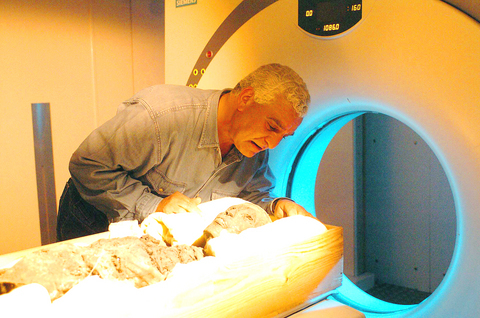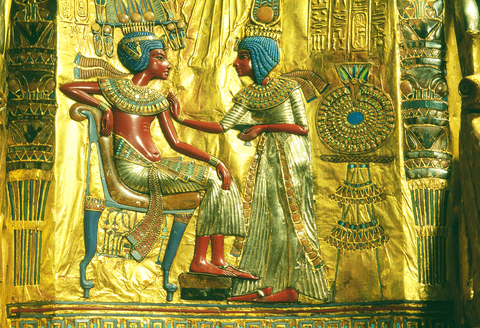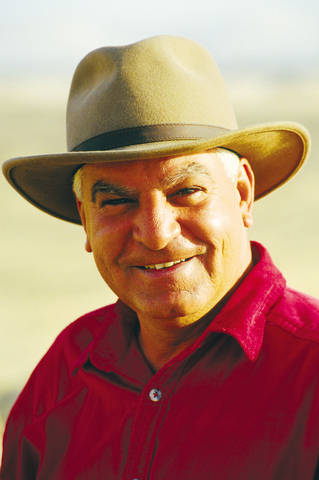Taipei Times: In the seconds before and after you opened the sarcophagus of Tutankhamun what was going through your mind?
Zahi Hawass: I was so afraid before I saw the mummy. I had had so many people ask me why I was taking the mummy out of its coffin, that I was so afraid. When I took the cover off and saw the face I felt magic and that moment is something I cannot explain to anyone. It was the best moment in my life.
TT: do you think that when English archaeologist Howard Carter opened the virtually intact tomb of Tutankhamun in 1922 that he unwittingly did more harm than good?

PHOTO COURTESY OF NATIONAL GEOGRAPHIC CHANNEL
ZH: I think Howard Carter did a good a job in many ways, but then he did damage it many other ways. If I was him, and had the seen the gold death mask, I would not have taken it out. I would have left it there. I see the mask in Cairo Museum all the time and every time I look at it I think that if it had been left there it would be an incredible sight today.
TT: Before you resealed the sarcophagus you placed a note inside. What did it say and why did you do this?
ZH: The note I wrote said that I, Zahi Hawass, had opened the sarcophagus in order to perform a CT scan on the mummy of Tutankhamun on January 5, 2005. I did add something that I didn't tell anyone. I said that I hope that in the future no one else will take the mummy out of the coffin and that if they do then the curse of the Pharaohs will be on them.

PHOTO COURTESY OF NATIONAL GEOGRAPHIC CHANNEL
TT: Do you believe in the curse of the Pharaohs?
ZH: No, I don't believe in the curse of the Pharaohs, but people love it.
TT: Why do you think that people of all ages and walks of life, regardless of religion or nationality, are so fascinated with the history of ancient Egypt?

PHOTO COURTESY OF NATIONAL GEOGRAPHIC CHANNEL
ZH: If you look at Egyptian history you see it has the Great Pyramid and people wonder today how it was built. The Sphinx. People look at the Sphinx and wonder about its history. Then there are the mummies and the magic that surrounds them and finally Tutankhamun.
No tomb of any ancient civilization has been found as intact as that of Tutankhamun and this has enabled us to create an accurate record of his life and that of the people of the time. These are the reasons I think Egypt is in the minds of so many people all over the world.
TT: You're a vocal advocate of the need for international museums to return any and all ancient Egyptian relics to Egypt. Do you think that such a move is now plausible considering that many of the artifacts have been housed in museums of international renown for almost a century?
ZH: You have to understand one thing. You have to make a big difference between a museum showing our artifacts and a museum stealing our artifacts. I don't mind the showing our artifacts in museums all over the world, but I do mind if the museum buys stolen artifacts.
To understand my point I'm not after the artifacts in museums to be brought back to Egypt. I want the big museums to work with us. The British Museum has the Rosetta Stone and the Berlin Museum has the death mask of Nefertiti.
I hope that museums such as these can understand and think about allowing us [the Cairo Museum] to show these artifacts for a few months for the Egyptian people to see.
TT: Is the illegal trade in stolen Egyptian artifacts still as rampant today as it was the early part of the 20th Century when Western explorers first unearthed many of the ancient tombs?
ZH: It's big. I am against people smuggling artifacts and am against anyone who helps smugglers and who buys stolen artifacts.
We recently caught two thieves who had been smuggling internationally for the last three years. They had collections in England and North America. These people are now in jail for 25 years in Egypt.
And we also recently put an American national in jail. He was caught stealing and selling artifacts from illegal excavations. We need to stop people from excavating illegally and buying and selling our historical artifacts all over the world.
My idea is to stop museums from buying stolen artifacts and in doing so I feel the trade will stop.
TT: Are there still many secrets with regard to the lives and deaths of Egypt's ancient rulers?
ZH: Thanks to CT scans we now know how Tutankhamun died and have been able to reconstruct his face. And such technology can help us reveal other personal secrets of the mummies. But for the most part, we now know nearly all there is to know about many of the Pharaohs. Very little is not known about when and how they lived.
There are about 6,000 mummies that are not of Pharaohs in Egypt, however, and we hope we can learn from more from them.
TT: If you could travel back in time and meet any ancient Egyptian of your choosing, who would you want to meet and why?
ZH: That would have to be Khufu (2551-2528 BC) because he can answer so many questions. As the builder of the Great Pyramid of Giza he built something that is a talking point for people all over the world. People still wonder about its secrets. He was a great man and I admire him.
The National Geographic Channel's week long special series entitled `Pharaoh's Week' begins tomorrow at 7pm.

Towering high above Taiwan’s capital city at 508 meters, Taipei 101 dominates the skyline. The earthquake-proof skyscraper of steel and glass has captured the imagination of professional rock climber Alex Honnold for more than a decade. Tomorrow morning, he will climb it in his signature free solo style — without ropes or protective equipment. And Netflix will broadcast it — live. The event’s announcement has drawn both excitement and trepidation, as well as some concerns over the ethical implications of attempting such a high-risk endeavor on live broadcast. Many have questioned Honnold’s desire to continues his free-solo climbs now that he’s a

As Taiwan’s second most populous city, Taichung looms large in the electoral map. Taiwanese political commentators describe it — along with neighboring Changhua County — as Taiwan’s “swing states” (搖擺州), which is a curious direct borrowing from American election terminology. In the early post-Martial Law era, Taichung was referred to as a “desert of democracy” because while the Democratic Progressive Party (DPP) was winning elections in the north and south, Taichung remained staunchly loyal to the Chinese Nationalist Party (KMT). That changed over time, but in both Changhua and Taichung, the DPP still suffers from a “one-term curse,” with the

Lines between cop and criminal get murky in Joe Carnahan’s The Rip, a crime thriller set across one foggy Miami night, starring Matt Damon and Ben Affleck. Damon and Affleck, of course, are so closely associated with Boston — most recently they produced the 2024 heist movie The Instigators there — that a detour to South Florida puts them, a little awkwardly, in an entirely different movie landscape. This is Miami Vice territory or Elmore Leonard Land, not Southie or The Town. In The Rip, they play Miami narcotics officers who come upon a cartel stash house that Lt. Dane Dumars (Damon)

Jan. 26 to Feb. 1 Nearly 90 years after it was last recorded, the Basay language was taught in a classroom for the first time in September last year. Over the following three months, students learned its sounds along with the customs and folktales of the Ketagalan people, who once spoke it across northern Taiwan. Although each Ketagalan settlement had its own language, Basay functioned as a common trade language. By the late 19th century, it had largely fallen out of daily use as speakers shifted to Hoklo (commonly known as Taiwanese), surviving only in fragments remembered by the elderly. In